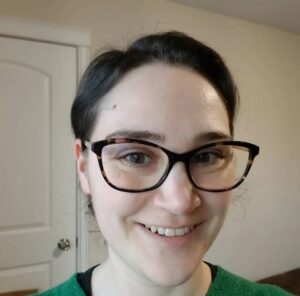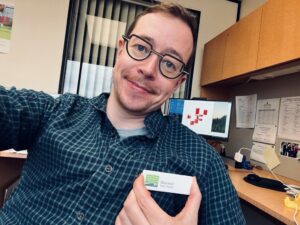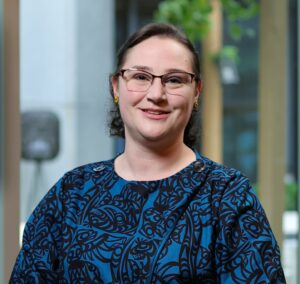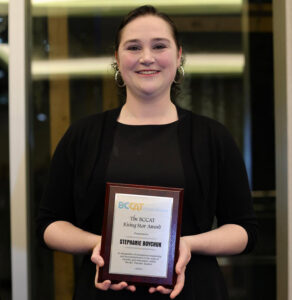ABE Articulation Steering: An Interview with the Co-Chairs Stephanie Boychuk and Shantel Ivits
Articulation is a method for facilitating student mobility between institutions in the BC transfer system by allowing students to get credit at a new institution for courses they took at their previous institution. Articulation groups are formed around specific disciplines, subjects or programs and meet annually to discuss curriculum, foster

inter-institutional partnerships and guide transfer credits. The British Columbia Council on Admissions and Transfer (BCCAT) is responsible for oversight of articulation at the provincial level.
Adult Basic Education (ABE) working groups function as articulation committees, and exist for a number of disciplines. Each working group reports to the Adult Basic Education Steering Articulation Committee, and working group chairs attend the meetings of both their working group and the steering committee each year. This year, the Articulation Steering committee is meeting in beautiful Kamloops BC. We had an opportunity to chat with Articulation Steering committee co-chairs Stephanie Boychuk and Shantel Ivits to learn what inspires them about their roles:
What experiences, people or events inspired you to work in the field of Adult Basic Education?
Stephanie:

Of all the work I have done, nothing has been as rewarding as working in Adult Basic Education (ABE). It is a bit cliche to say, but being a steppingstone on someone’s path to changing their life fills my heart. All the different hats I wear in my ABE work (instructor, department chair, and articulation support) are worn with the goal of firming the ground under students’ feet and reducing as many barriers as I can for them.
I love that ABE prioritizes creating spaces where students can feel safe and have a sense of belonging, because I remember what it is to struggle and feel out of place in university. I would often put in very late nights in the 24/7 library study commons just to feel slightly less behind my classmates. I took a 5-year combined Bachelor of Science and Bachelor of Secondary Education which meant I wasn’t “really” a Science or Education student. I ended up feeling like I didn’t belong in any of my classes for much of my university career. When I began my Master of Education years later, I was at such a different point in my life and career then my classmates it took three classes and 6 months to deal with my imposter syndrome, despite all the instructors and my classmates being lovely and supportive. I love that ABE programing is built around safety, belonging, and support because that is what all students deserve from their education.
ABE instructors understand that everyone has something to bring to the classroom and that everyone is capable of learning, even when it takes some of us longer than others. I am in awe of the students who walk through our doors (or sign into our LMSs). I have worked in retail, research science, as a private tutor, and in technology support in addition to working as an instructor and department chair. Each time I have hit a career crossroads or felt lost I have had an incredible amount of support from family and friends to help me make the changes I needed to. The students who take the step to come to us deserve that same support and more. The work we do can help students build a network that supports them, and hopefully will carry them forward beyond us.
I have spent a lot of time working in post-secondary education, at various staff levels, and I understand that it takes a community to do this work. Students’ experiences are affected by their instructors, fellow students, the support staff, administration, and all the policies and procedures that govern an institution. Although I am passionate about being in the classroom, I have always felt part of my role needed to be understanding the walls of the sandbox we work in and using that knowledge for the benefit of my colleagues and students. Discovering how to push on or move those walls takes trusting relationships across and beyond an institution. The work of ABE is transformative because of the many kinds of relationships we build. I am so grateful for all the people I have had the chance to work with.
Shantel:
 From a young age, I always dreamed of being an elementary school teacher. I created a lifelike classroom in the attic of our farmhouse in Ontario and made lessons for imaginary kids and any real kids who would agree to be ‘my student.’ In university, I did a concurrent teacher education degree alongside my Bachelor of Arts in English. When I came out as queer and trans, I faced a lot of violent homophobia and transphobia just walking down the street. I didn’t see how I could ever be a queer and trans elementary school teacher. I dropped out of my teacher education program and moved to Vancouver to do a Masters in Society, Culture and Politics in Education. That gave me the confidence to finish my Bachelor of Education degree. I am non-binary and during my practicum, I was told by a professor that I needed to pick a gender because schools are conservative spaces. When I finally graduated it was impossible to get hired as a trans person, even for low-paying tutor positions. I was told parents would be worried I would turn their kids trans. This was nothing short of devastating. When I finally got hired as a teacher on call, children would always ask without fail if I was a boy or a girl before even saying hello. I was terrified of the repercussions of answering honestly, but unwilling to lie. I always answered honestly, with mixed results. I kept my stereotypically feminine name because I like it, but am otherwise masculine presenting and easily read as male. Principals and teachers looked at me skeptically – I even got ID’d by a principal once in front of the whole class. It was a hostile environment and terrible for my mental health. I quit and took a job in an adult literacy program at SFU. And it was such a welcome change. The adult literacy students had all faced battles of their own and showed no judgment about my gender. The work environment was safe and supportive. One day I said to my supervisor, “I’m so glad you don’t care that I’m trans.” She said, “We do care – and we love you for it.” That’s when I knew I found my calling. Like many adult learners, I’ve been through hell in the education system. But as a result of that, I care deeply about making education more welcoming and supportive for anyone who is marginalized based on difference. This work is deeply rewarding for that reason. It gives me a sense of purpose.
From a young age, I always dreamed of being an elementary school teacher. I created a lifelike classroom in the attic of our farmhouse in Ontario and made lessons for imaginary kids and any real kids who would agree to be ‘my student.’ In university, I did a concurrent teacher education degree alongside my Bachelor of Arts in English. When I came out as queer and trans, I faced a lot of violent homophobia and transphobia just walking down the street. I didn’t see how I could ever be a queer and trans elementary school teacher. I dropped out of my teacher education program and moved to Vancouver to do a Masters in Society, Culture and Politics in Education. That gave me the confidence to finish my Bachelor of Education degree. I am non-binary and during my practicum, I was told by a professor that I needed to pick a gender because schools are conservative spaces. When I finally graduated it was impossible to get hired as a trans person, even for low-paying tutor positions. I was told parents would be worried I would turn their kids trans. This was nothing short of devastating. When I finally got hired as a teacher on call, children would always ask without fail if I was a boy or a girl before even saying hello. I was terrified of the repercussions of answering honestly, but unwilling to lie. I always answered honestly, with mixed results. I kept my stereotypically feminine name because I like it, but am otherwise masculine presenting and easily read as male. Principals and teachers looked at me skeptically – I even got ID’d by a principal once in front of the whole class. It was a hostile environment and terrible for my mental health. I quit and took a job in an adult literacy program at SFU. And it was such a welcome change. The adult literacy students had all faced battles of their own and showed no judgment about my gender. The work environment was safe and supportive. One day I said to my supervisor, “I’m so glad you don’t care that I’m trans.” She said, “We do care – and we love you for it.” That’s when I knew I found my calling. Like many adult learners, I’ve been through hell in the education system. But as a result of that, I care deeply about making education more welcoming and supportive for anyone who is marginalized based on difference. This work is deeply rewarding for that reason. It gives me a sense of purpose.
Can you tell us a bit about articulation in BC and the history of articulation in BCCAT? Why does it matter to educators and how does it impact students?
Shantel:

BC has a long standing tradition of collaborating across post-secondary institutions to establish shared standards around curriculum. This allows our separate institutions to function as a more cohesive system that students can move between with greater ease. These articulation networks have become the bedrock for communication and collaboration for ABE programs in BC. Articulation meetings are an essential forum for exchanging knowledge, practices, and resources so we can learn from one another and grow together to better serve students across the province. ABE is also a program that requires a fair bit of advocacy to survive – both within post-secondary institutions and externally to the government. Advocacy is always most potent when the people who are advocating are organized, have a cohesive voice, and have strength in numbers. The articulation system gives us the infrastructure to achieve these ends.
Stephanie:
 ABE articulation began in BC in 1985. There have been a lot of changes in ABE since then (there is a timeline in our articulation handbook here) including moving of ABE between ministries, adding and removing tuition fees, and the creation of the BCADG. Throughout all those changes, I believe articulation has supported the creation of a common voice from which our programs can advocate not only for our students, but the necessity of the work itself. ABE articulation is a bit different from credit (academic) pro
ABE articulation began in BC in 1985. There have been a lot of changes in ABE since then (there is a timeline in our articulation handbook here) including moving of ABE between ministries, adding and removing tuition fees, and the creation of the BCADG. Throughout all those changes, I believe articulation has supported the creation of a common voice from which our programs can advocate not only for our students, but the necessity of the work itself. ABE articulation is a bit different from credit (academic) pro
grams because we have shared learning outcomes and work together at meetings to move courses on or off the transfer guide, whereas credit programs have agreements between individual institutions. I really appreciate the way ABE articulates courses, it gives us opportunities to talk together not just about courses and learning outcomes but also the broader challenges we face and the vision of what our courses and programs can become. Given that at some of our member institutions ABE is not held within a single faculty or department, this provides a much-needed community for some instructors.
The purpose of BCCAT includes equitable treatment of students and students getting credit for equivalent learning (from their website here). For me, this is one of the main reasons I stay involved in articulation. I don’t feel academia is especially good at honouring students’ knowledge, but articulation is one way we can begin to move the needle on that issue.
On a smaller scale, I think articulation helps instructors and students see a clear pathway between each level and course. It helps instructors know what to expect students to know when they reach their classes and give students clear outcomes to strive for. Articulation also respects the autonomy of all institutions. Each institution can develop curricula to meet the outcomes in ways that make sense for their communities and students. In this way, articulation provides a flexible structure for ABE programs.
Question for Stephanie: You recently received a 2023 BCCAT Rising Star Award in recognition of your work to help advance access and mobility (to ABE courses). What areas do you hope to focus on going forward?
 I am very grateful to my dean, Jean Maltesen, for putting together the application package, as well as to the folks who took the time to write letters of support – Shantel Ivits, Andrew Armour, and Michele Patterson. It means a lot that the people who are so critical to the work I was nominated for felt it was worthy of this honour.
I am very grateful to my dean, Jean Maltesen, for putting together the application package, as well as to the folks who took the time to write letters of support – Shantel Ivits, Andrew Armour, and Michele Patterson. It means a lot that the people who are so critical to the work I was nominated for felt it was worthy of this honour.
In the short term, I want to continue the work of updating and clarifying our documents, policies, and procedures (I am a bit of a policy wonk). I believe having a clear policy or procedure is the foundation needed to grow. From my online development background, I also believe strongly in iterative development and continuous improvement. So, I am hoping the work I am being supported in doing now can be taken forward to new and more impactful work going forward.
Longer term, I am really excited by the discussions happening around how articulation can support courses that are “non-traditional” (for lack of a better phrase). Courses that are inter- and multi-disciplinary don’t fit well within our current structures. I feel an authentic energy and interest from the members of the Steering Committee to create something more inclusive that better honours all the learning students can do with us. I feel that work could be one way ABE articulation can create real and lasting change that is valuable to all students. I am hoping I can help support that transformation and see it through to becoming part of our normal work.

